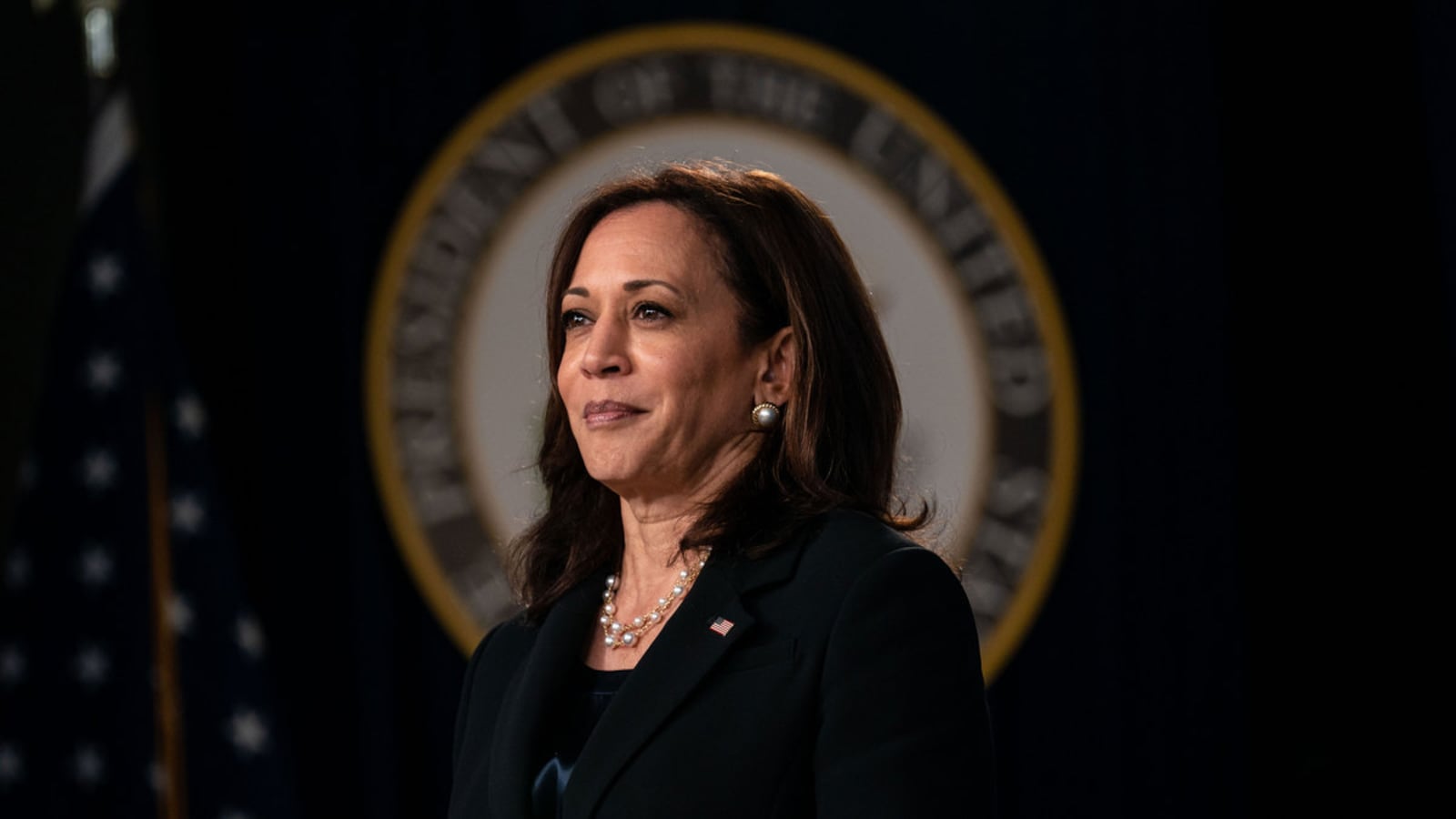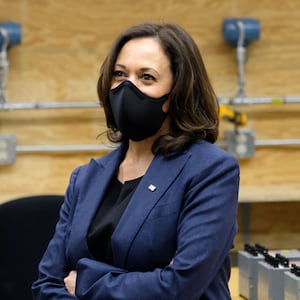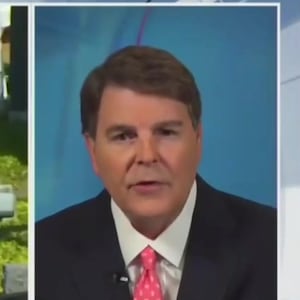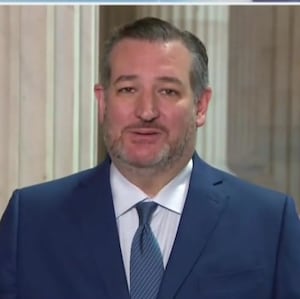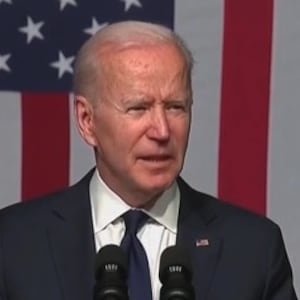The office of the vice president of the United States is under siege these days.
Is this in spite of the fact that Kamala Harris has already had a historically significant political career? Or is it because of it? Is it in spite of the fact that the 57-year-old is heir apparent to the oldest president in American history, or because of it? Is it in spite of or because of the fact she is a woman of color who has ascended to an unprecedented level in a country in which politics has, since the beginning, been dominated by white men?
Is she really “difficult”? Is there really “just something about her” people don’t like? Or do these critiques have a familiar ring about them because they are the darts of choice the political patriarchy uses to attack women in positions of power?
What we do know is this: Vice President Harris has recently been subject to a degree of press scrutiny that is unequaled by any modern holder of the office who was not also the architect of an illegal war and a proponent of torture who also happened to shoot one of his friends in the face with a shotgun. The media attacks on her have ranged from the absurd—critiquing her for her choice of a souvenir on a recent trip to France or for a “Bluetooth phobia” that was actually just a sound security precaution—to whisper-fueled analyses of her management style that fail the laugh test when set alongside the behavior of men in top jobs or her level of achievement throughout her career.
These pieces have come despite a first-year track record that is impressive, substantive, and wide-ranging. Indeed, upon examination, Kamala Harris is enjoying a very Biden-like vice presidency. Like the president, she has ignored the inside-the-Beltway buzz from a D.C. press corps going through a bad case of withdrawal after the never-a-dull-moment train wreck of the Trump years. And, like the man she works alongside, she has kept her head down and done her job.
Few areas reveal her successes and strengths as clearly as how she has handled her broad foreign policy portfolio. While she has not received credit for much of what she has done in this area, she has been undaunted, working with a methodical intensity that has won admirers around the world and among her closest colleagues.
While the vice president’s critics often make much of her low approval rating in opinion polls, the fact is, many Americans are still learning about her. Only 3 percent of us don’t have an opinion on how well Biden is doing. More than six times as many do not have a view on Harris. That’s not unusual. It is almost exactly the same position that Joe Biden was in after he had served as VP for four years following four decades of high-profile Washington service.
For Americans still trying to get to know Harris, the recent tsunami of press coverage about her has not been much help. Setting aside the silly feeding frenzy stories, even more “in-depth” pieces have offered more heat than light.
One example was a CNN story last month, entitled “Exasperation and dysfunction: Inside Kamala Harris’ frustrating start as vice president.” While the article was full of retweetable rips from anonymous critics, its on-the-record quotations were from supporters of Harris, including the president’s chief of staff, Ron Klain, who said she was “off to the fastest and strongest start of any Vice President I have seen.” Other stories in the avalanche of recent coverage of the vice president have also relied on the blind-quote-driven theme that her office, following a series of staff departures, is supposedly not a happy place.
While Harris’s management style can be rough, the focus on it echoes that of attacks on other women in politics like Senator Amy Klobuchar and is distinctly different from that men usually receive. For example, even “genial” Joe Biden is also known to have a temper, a salty vocabulary, and to be short with staff while Trump would regularly “go completely nuts” or “erupt like a volcano” or “uncontrollably rant.” in the words of several senior Trump administration officials with whom I recently spoke for a book project on which I am working.
Other lines of attack on her in the media have been just plain wrong. Writing in the Wall Street Journal, Peggy Noonan argued that Harris has not focused seriously enough on foreign policy and implied she has paid to0 much attention to political appearances. She wrote, “Ms. Harris should set her mind primarily on the deep and profound responsibilities of the job she may have to fill. She should do this as an act of will. Only secondarily should she be thinking about her political prospects.”
That’s good advice for a vice president. But as it happens, that is precisely what Harris is doing.
In fact, when National Security Adviser Jake Sullivan saw some of the pieces suggesting there were problems with the vice president’s role within the administration he thought to himself, “Did I miss something? In the national security space we work extremely closely with her team. I personally work extremely closely with her. The president constantly seeks her input, seeks her counsel, gives her important missions.”
Secretary of State Antony Blinken, who has worked closely with Harris in preparation for her trips and high-level meetings, commented, “Through dozens of meetings, calls, and overseas trips, Vice President Harris has taken on some of the most important challenges our country faces—whether that’s address the root causes of migration, reinforcing global health security, or standing up for the rights of women and girls. As we saw in Paris, she is equally adept at deepening our relationships with our closest allies and partners, as she has done in the Indo-Pacific.”
While these are the comments you might expect from administration colleagues, taking a look at her track record and speaking to officials overseas supports their point of view. For all the flak Harris and the administration have received on immigration, she has played the central role in re-establishing a working dialogue with Mexico’s president and with leaders in Central America. Her efforts at controlling immigration at its sources have directly resulted in the formation of a new anti-corruption task force focused on countries in Central America to ensure aid dollars are not misspent, a human smuggling and trafficking task force, a program on women’s empowerment, and funding for housing and business in the Northern Triangle. Just this Monday, she announced over $1.2 billion in U.S. investments in Central America, made in response to her call last spring for U.S. companies to help stimulate economic growth there as a way of helping to stem the tide of migration at its sources. Said one senior Mexican foreign ministry official, “Her result-oriented focus has made a big difference.”
Similarly, her Paris trip saw major steps forward in the healing of the U.S.-France relationship following the AUKUS submarine sale contretemps. A sign of this was that following their two-hour one-on-one meeting, French President Emmanuel Macron went to great lengths to show other foreign leaders his respect for her. He went out of his way to meet her before official events so they could enter together. He also had her at his side during the dinner he hosted for visiting heads of state. On this trip, she also urged the U.S. to participate in a Libya forum and then represented our country at the event. It was a topic the U.S. had often sidestepped because U.S, views were sometimes at odds with those of our allies. But she faced the challenges and demonstrated America was willing to play a leadership role seeking to grapple with the complex issues in that hotspot. According to one European participant in the event, “She had an enormous impact.”
Sullivan noted that, “One similarity between the Obama-Biden relationship and the Biden-Harris relationship is that he insists she be in every core decision-making meeting. She weighs in during those meetings, often providing unique perspectives. And when everyone else leaves the room he will often ask that she stays and they talk. While their experiences are different, he values her willingness to ask tough questions.”
Her approach, according to her national security adviser, Ambassador Nancy McEldowney, and deputy national security adviser, Dr. Phil Gordon, has made an impact on a wide range of issues large and small. These ranged from helping to shape how key diplomatic messages have been presented to being deeply involved in sensitive issues like managing the response to a security threat—associated with a concern about “Havana syndrome” attacks on U.S. diplomats—that emerged on the eve of her trip to Southeast Asia, from providing candid counsel to the president to driving the efforts like those mentioned above to ensure her overseas missions have produced tangible results on an on-going basis.
In addition, Harris has also been seen, in the eyes of Blinken, Sullivan, and other national security officials with whom I spoke, as a champion of what Sullivan described as “the frontier elements of foreign policy.” Citing an example, McEldowney notes, “She has advocated for a stronger response to cyber attacks and threats—as in the case of the recent ransomware attack. She is focused on 5G, AI, Quantum and the need to strengthen our cyber defenses, be more aggressive about the attribution of attacks and to hold attackers accountable.” On her trips to Europe and Asia, cyber discussions and agreements have been a top priority.
One particular irony of the recent criticism of the vice president is that much of it has come from Republicans who are acolytes of our last president, who egged on supporters wanting to put his own vice president to death.
And while that may be an extreme example, past vice presidents have virtually all faced serious challenges. At this point in the Obama administration, for example, Obama had just rejected Biden’s arguments to significantly reduce the U.S. presence in Afghanistan. During the first year of the Bush 43 administration, before he turned his focus to helping launch an illegal war in Iraq, Vice President Dick Cheney was attracting criticism as the often secretive lobbyist-in-chief for Big Oil in the Bush White House.
Al Gore’s relationship with Bill Clinton grew very frosty. The Bushes were famously not close to the Reagans. The list is long and goes all the way back to the beginning of the Republic when Washington and Adams and then Adams and Jefferson seldom spoke… and Jefferson actively wanted to try his first vice president for treason. (One of FDR’s VPs, John Nance Garner, famously said the job is not worth “a bucket of warm spit.”)
Harris has several advantages doing this tough job, not the least of which is her genuinely good working relationship with Biden, one founded in ties that go back to her friendship with Biden’s son Beau. She has also benefited from the fact that so many key people in this administration understand the vice presidency so well—from Biden to officials who served on his staff as VP like Klain, Blinken and Sullivan.
Members of that team emphasized to me that vice presidents typically take some time to grow into the roles they eventually become known for—as was the case with Biden taking the lead on the relationship with China’s Xi Jinping during the Obama years. They argue that what we’ve seen in the past 10 months, impressive as it is, is just a start and that over time, her track record will speak every more loudly for itself. They also note that from undertaking scores of meetings and phone calls to support the president’s legislative agenda to police reform to voting rights, the vice president has also done significant work on the domestic front. (For a recent look at her work on the infrastructure project, see this.)
Speculation that, due to his age, Biden will be a one-term president and her own role breaking a major historical barrier have, however, denied this vice president the option her predecessors had of working in the shadows. While the White House has stated as recently as late November that it is Biden’s intention to run again in 2024, even some of the president’s strongest supporters are uncertain.
As Biden approaches his 80th birthday, Harris will remain in the glare of a spotlight more intense than that trained on most of her modern predecessors. As a result, whether media efforts to slime her are fair or not, they will likely continue in her future–whether from Democrats who want her to make way for what they perceive as more viable candidates or from Republicans who fear her candidacy or who simply get points with their base for going after a woman of color.
Beyond continuing to do the work of being vice president, Harris and the White House will have to get their arms around the unprecedented levels of scrutiny she will continue to face—like around how she manages her office. She and the White House can not simply wish these away or condemn them as unfair. They must deal with them and, for example, the fact that she has a new team coming together to help her do just that is a sign that they recognize this. Key advisers to the president also recognize that the success she has had with leaders internationally echoes that which she has had throughout her career as the attorney general of California and in the U.S. Senate, and that her intelligence and energy and charm can be powerful assets that can be harnessed even more effectively..
For these reasons, it seems clear that Biden’s inner circle will continue to have to grapple with what might be called the Kamala Conundrum. She can’t simply be treated as past VPs were, because like it or not her situation is different on several levels. They must somehow deal with the the fact that if they support and promote her more aggressively, as they should and as she deserves, it may be spun by the chattering classes into the perception (facts or intentions be damned) that the president is a lame duck. But if they fail to do so, it will be interpreted or presented by her rivals and opponents as a critique or sign of her weakness.
The answer to striking this balance is that just as Harris’s position is unprecedented, so are the stakes in America’s current political battles. Defeats for the Democrats in upcoming elections could result in the GOP accelerating its efforts to undo crucial democratic principles and protections, undermining our entire system of government. With abortion rights and voting rights likely to top the agenda for the mid-terms, a much higher profile role for the vice president seems like a strategic necessity.
And looking ahead to 2024, the White House’s actions must reflect the fact that if Biden is not able to run, he, the party and the country would be better served if there were one clear heir apparent. Overheated D.C. rumor-mongering aside, it is very unlikely that any other Democratic candidate will be as well prepared to assume the role of commander-in-chief as the woman who currently holds the country’s No. 2 job.
